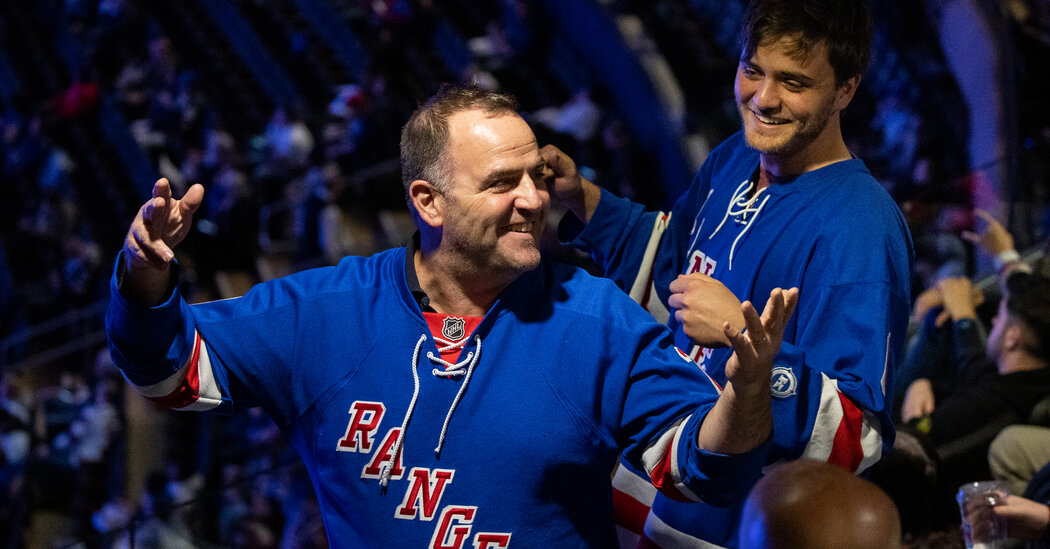
Mark Reiss has been a Rangers season-ticket holder since 2001, perched high in the blue seats with his two sons, who grew from toddlers to adults under the iconic Madison Square Garden ceiling.
For two decades, they watched their team fail to make the N.H.L. playoffs almost as often as it qualified, and then, on Feb. 8, 2018, they received the famous email from Rangers management. It explained the unthinkable, and was a note of demarcation. Their team, rooted in the heart of Manhattan and able to deploy more financial muscle than any other team in hockey, was rebuilding for the future.
“I was actually ready for a reboot,” Reiss, a coastal marine scientist, said. “But when you read that email, you got a pit in your stomach. It felt like, ‘OK, this is going to be rough.’”
The rough part is finally over. After four years with no playoff games to attend, Reiss, his younger son, Matteo, and thousands more loyal Rangers fans like them will fill the Garden on Tuesday for the first home playoff game there since the Letter.
Reiss said in recent years that he had grown a little impatient with the process, but as arduous as it has seemed at times, the result has come with the impact of an Artemi Panarin slapshot. The 2021-22 Rangers blasted expectations in a breakout season under their first-year coach, Gerard Gallant.
The Blue Shirts won 52 games and earned 110 points, the most since they won 53 and had the league’s best record in 2015. They carried a battle for the Metropolitan Division crown into the final week of the season and earned home-ice advantage in the first round of the playoffs against the Pittsburgh Penguins.
They did it all as the second-youngest team in the playoffs, with an average age of 26.5 years, according to Elite Prospects, lending credence to the notion that this team is more than a one-hit wonder.
“They’ve brought hope to this city that they are on their way to winning a championship,” said Joe Micheletti, a former player and assistant coach and a Rangers analyst on the MSG Network since 2006. “They are a Cup contender this year, and they are only going to get better. Everybody can feel that.”
When the Nets were swept out of the N.B.A. playoffs last month, conversation turned to which New York team could win the next championship. Many mentioned the Mets and the Yankees. But what about the Rangers?
“We’re a good team ready to take off,” Gallant said recently, “and that’s what we want to be.”
The rebuild that put the team on the runway was an intriguing process from the start. Marquee teams in New York rarely embark on complete roster renovations, and the Rangers, under the team owner James L. Dolan, seemed especially unlikely to do so — and to acknowledge it so publicly.
Veterans were traded, the team bought out the contract of Henrik Lundqvist, the beloved goalie, and traded for key players like Adam Fox while drafting Kaapo Kakko No. 2 overall in 2019 and Alexis Lafrenière No. 1 in 2020. Those two, along with their fellow first-round picks K’Andre Miller, Braden Schneider and goalie Igor Shesterkin, represent the long-term youthful core of an auspicious future. Shesterkin is 26. The rest are under 25.
But the Rangers never lost sight of veterans, either, signing Panarin as a free agent in 2019 and extending the contracts of Mika Zibanejad and Chris Kreider. Things seemed to be moving, albeit methodically, in a positive direction.
But then, in a stunning departure, the original architects of the effort — Jeff Gorton and John Davidson — were dismissed after last season, and David Quinn, the coach, would soon follow them out the door. Perhaps the rebuild was a bit too methodical for Dolan. He promoted Chris Drury, the former Rangers player and youth baseball star from Trumbull, Conn., to run the front office and accelerate the process.
Firing Quinn and hiring Gallant were Drury’s most significant moves, a tone setter that announced to players and fans a heightened sense of urgency under a no-nonsense coach. But Drury also fine-tuned a roster that Gorton had largely built. He added Ryan Reaves and Barclay Goodrow in the summer to provide some snarl, and then, before the March 21 trade deadline, he acquired players like Frank Vatrano, Andrew Copp and Tyler Motte. Since the deadline, the Rangers have played their best hockey.
If the current roster is a recipe of various ingredients prepared in phases by different cooks, Gallant is the one who brought it all together for presentation. Micheletti, who will call the first round of the playoffs for MSG Network, along with Sam Rosen, refers to Gallant as “the most unique coach in the N.H.L.”
“He doesn’t overcoach,” Micheletti said, “and that alone is unique in this day and age. He keeps enough distance and lets the players run the team. If they don’t, then he’ll step in. But he usually doesn’t have to because he trusts the players and they take ownership.”
In 11 years with the Detroit Red Wings and the Tampa Bay Lightning, Gallant, 58, played a straightforward team game, scoring, assisting and throwing shoulders and fists when necessary.
His direct coaching style, which came out of that somewhat bygone era, seems to have unlocked the Rangers’ potential. Gallant wants the puck moving straight up the ice, not side to side. He wants the players to grapple for possession, and if they lose the puck, to fight equally hard to get it back. He demands contributions at both ends of the ice, but allows players to accentuate their special talents, particularly when they are as gifted as someone like Panarin.
“That’s what it’s been,” Gallant said recently. “Let them do what they are going to do.”
Gallant engineered one of the greatest coaching performances in any sport when he took the expansion Vegas Golden Knights, with a veteran roster, to the Stanley Cup finals in 2018, their first season in the league, before they lost to the Washington Capitals in five games. Two years later, the team fired him midseason.
In New York, he has had a rebirth with a much younger team, but without changing his approach. Vatrano, who scored eight goals in 22 games since joining the Rangers, said that when he arrived the coach’s message to him was simple: Be yourself.
“The biggest thing is, he doesn’t restrict your game,” Vatrano said. “He lets you play. If you are an offensive guy, he wants you to make plays, but within that structure he also wants you to play smart. If you mess up, you know you messed up.”
But Gallant is not a yeller behind the bench. That reduced tension when things went wrong, allowing the Rangers to come from behind to win 27 times this season, second most in the N.H.L.
It does not seem coincidental that several players, including Panarin, Miller, Zibanejad and especially Kreider and Shesterkin, have enjoyed career years under Gallant’s tutelage.
Shesterkin’s mesmerizing growth this season is the likely key to any potential success in the playoffs. He has the highest save percentage (.935) and the lowest goals-against average (2.07) in the league. He is the presumptive Vezina Trophy winner as the best goalie, and the reason some see the Rangers as a threat.
“They’ve got a really good mix of skill and young players, and they’ve got the goalie,” said Peter Laviolette, the Capitals’ coach. “The rebuild is over. They are ready.”
Micheletti said that at some point this season, he noticed that the Rangers acquired a belief that they could beat anyone in the league. Fans have picked up on that, too. Some of them, like Reiss, wonder if the Rangers’ lack of experience could be their undoing in the playoffs. But at least there are playoffs.
“It’s been four years,” Reiss said, referring to the club’s promise to fans. “I’m pretty cynical by nature. But from where I’m sitting up in the blue seats, what is there to complain about?”




